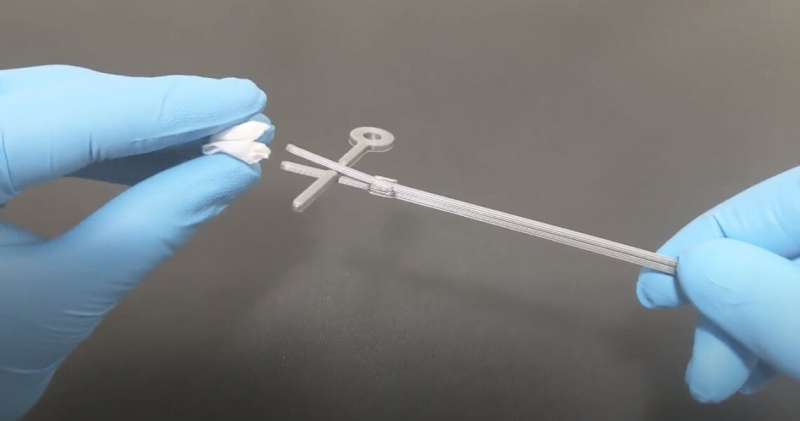Physics team provides novel swab design, free of charge, to augment COVID-19 testing

A team of NJIT physicists has developed a novel test swab that can be 3-D printed using inexpensive, widely available materials and speedily assembled in a range of fabrication settings. To augment the nation's testing capabilities, the inventors are making the swab's design publicly available to large and small manufacturers, free of licensing fees, during the COVID-19 emergency.
The developers, from NJIT's Additive Manufacturing Lab (AddLab), committed to the Open COVID Pledge and posted the design on the National Institutes of Health's 3-D Print Exchange website, which provides technology related to biomedical science that is readily compatible with 3-D printers. While they filed a provisional patent on the design in mid-April, they say it's important to make it available immediately. Basic medical supplies, including swabs, are still in short supply.
"Broad testing is essential to contain the spread of the virus," said John Federici, director of the AddLab. "We've created a device for medical personnel in need of inexpensive, rapidly producible supplies when their normal channels fail. We're making it temporarily available through an open license to address shortages caused by the pandemic."
The design has novel features that simplify fabrication and storage and reduce contamination risk.
The typical swab is a 7-inch stick with synthetic material, such as rayon or dacron, attached to the swabbing end. After the sample is taken from the nose or throat, the swab is cut off, preserved in solution and then tested with a chemical called trizol that recovers RNA from the virus.
The AddLab swab, by contrast, consists of two interlocking arms that work together, like forceps, to grip the swabbing material. By sliding the two arms against each other, the device can eject the sample, depositing it into a vial with no need to handle it.
"Our swab releases the sample without the need for a pair of scissors to cut it. This removes a step from the process, and a piece of equipment, thereby reducing the chance for contamination and spread of the virus, while also speeding up testing," explained Samuel Gatley, the senior additive manufacturing technician for the AddLab.
To speed fabrication and reduce costs, the team designed a swab that doesn't require a support structure during its production.
"Often, 3-D printers lay down a scaffolding made from the same filament as the part, which is broken off and discarded after the print is completed," noted Nicholas Warholak '19, a technician and designer for the team, who also worked on folding configurations for the swab tip. "The NJIT swab is designed around geometries that eliminate the need for a support structure. This shaves off time and material. Over a 1000-unit run, a savings of 10 seconds and 0.1 grams per unit translates to over 2.5 hours and $2.00 of filament. On the scale that is needed globally, which is millions, the savings becomes even more significant."
The swab is intended for immediate use to detect COVID-19 infections, but can be deployed in the future to detect a range of pathogens in pandemic hot spots around the globe since it can be fabricated locally using inexpensive 3-D printing technology from a design that is downloaded either from the cloud or a website, avoiding the logistical problems of shipping medical supplies. The plastic forceps can be sterilized and reused.
"Innovations in technology, quickly executed, will help us achieve the goal of getting ahead of the virus," said Atam Dhawan, NJIT's senior vice provost for research. "Safe, effective and easily produced medical supplies are key to this fight. Large-scale testing will allow us to develop plans to return to work and resume normal operations."
The AddLab creates a variety of functional prototypes using techniques such as 2-D and 3-D printing in conjunction with embedded electronics.





















